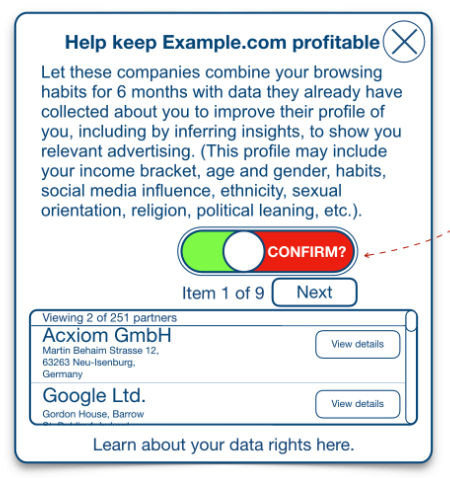A couple of months ago, I was discussing with two business contacts of mine about their plans and priorities for 2018: they had to decide about strategic investments, and they asked my opinion about choosing and implementing a DMP for their business. This got me thinking.
Well, it’s 2018, and DMPs are so 2016…
Reminder : DMPs are an (optional) link in the RTB programmatic chain. DMP’s main capability is to combine 1st, 2nd and 3rd party data in order to create specific audience segments, to be exposed to display ad campaigns.
If you live in the EU, or if your business has some B2C activity with individuals from Europe, then you will soon be bound by the now famous GDPR regulation. As we’ll explain here after, the GDPR regulation has some direct consequences on the way a DMP (and on a wider scale, the programmatic ad-tech industry) can be operated.
3rd Party Data Vendors
The business of selling massive amounts of anonymous data will probably not survive GDPR. This business was already in bad shape a couple of years ago, and most of the pure players had tried to pivot to some other form of activity, but this time it’s getting worse. GDPR enforces full opt-in for data collection, and makes it mandatory to clearly state the all usages for the collected data.
Where do 3rd Party Data vendors collect their data from has always been the dirty little secret in this ad-tech industry. It’s in nobody’s interest to ask too much questions. All you want to know, is that someone acts as a proxy, sells data and does the dirty job in the back-office. And I won’t even discuss 3rd party data accuracy.
Here for instance, Oracle Bluekai thinks I’m a soccer and WorldCup enthusiast, and a NASCAR fan. Those of you who do know me also know how ridiculous this is.
It’s going to be _very_ tough for data vendors to be able to collect, trace, anonymize and allow for deletion of all collected data. I honestly don’t see how these business could survive. The funny thing is that every now and then, I stumble on interviews from 3rd party data vendors(*) who swear to God that they are already GDPR compliant, or they will soon be…
The market for 3rd Party Data is almost dead. Let’s consider DMPs only for 2nd and 1st party data then…
(*) : not all of them.
2nd Party Data
Second party data is just someone else’s first party data. 2nd party data happens when several advertisers and/or published agree to ID sync and share information about their common audiences. With GDPR, all data collected will have to be collected with full opt-in, and after presenting all the details of the use of the data to the individuals.
Collecting the opt-ins for a 2nd party data sharing scenario on some Example.com website could look like this:

Do you believe that many people would simply click « OK » and blindly accept to share their personal data with sites and services they never heard about, if they are asked to? I don’t think so.
I think we can assume that 2nd party data partnerships will disappear when GDPR comes into play.
OK then. Let’s play safe and use DMPs just for 1st party data
Why not. But if your DMP is only useful for using your first party data for segmentation, you could probably directly use some modern DSP capabilities. Or if you want to use some of your CRM data, you could use services of some CRM onboarder like Temelio or Graphinium. Or if you want to do social advertising, or retargeting, you could use formats from Facebook, Amazon, Google, or twitter such as « custom audiences », RLSA, and the likes.
And you don’t need a DMP. And you don’t have to spend 3 to 6 months on the deployment and invest between 100 and 200k€ of your budget on year 1 just for the platform fees and setup.
DMPs for insights and customer intelligence?
Not really either. In a recent industry report, 9 out of 11 DMP vendors were rated « Poor » about « Analytics and audiences insights offerings ». By design. Simply because most of the DMPs were designed as activation platforms, not as analytics platforms. There’s a disconnect between DMP capabilities and the reality. In my opinion, this is partly caused by the name « Data Management Platforms » and the fact that few people do their homework and fully try to understand what they’re really buying.
If you want to get insights about your customers, and want one platform for actually managing all PII and non-PII data, also while keeping track of the opt-ins and be able to provide an audit trail, you should probably look for CDPs (aka Customer Data Platforms) which are getting more and more popular as the deadline for GDPR compliance comes closer.
If I was running your business, would I buy a DMP in 2018?
Would I sign a PO for a three years engagement for a DMP, if I were you? Probably not.
More than 50% of enterprises currently use a DMP, either directly or through an agency partner, according to Gartner’s Marketing Technology Survey (published Sept 2017, also numbers may slightly differ in our old Europe). Of the marketers without a DMP, one in five felt they didn’t need one.
Does this means that it’s the end of « Data Driven Marketing »? Absolutely not. There are many tools and solution alternatives, and also, GDPR is a great opportunity for businesses for adopt a different, more long term and customer centered approach to online marketing. And I’m convinced that your customers will appreciate this.
The Golden Age for DMPs is behind us. I’m glad I wrote my DMP blog posts series in 2016 :)
What then?
Start with small data. Do your homework. Understand your customers. Understand who they are, and why they buy from you, what they like in your brand and products. And surprise them. Please them. Add value by easing their lives as a customer, solving one issue at a time.
See also…
[DIGIDAY UK] GDPR is coming, and data management platforms are in the crosshairs
[DIGIDAY UK] With GDPR looming, DSPs are under pressure to adapt
[DIGIDAY UK] Ad retargeters scramble to get consumer consent
[DIGIDAY UK] Once a must-have, marketers sour on DMPs
About me: Christophe is a freelance Data Marketing consultant. You can check my profile on consulter mon profil sur Malt.fr and hire me for your own needs or to support your internal teams.


Pingback: Double Down sur le CRM et la Fidélisation – Christophe Lauer
Pingback: Is The DMP Finally Dead? | AdExchanger
Comments are closed.